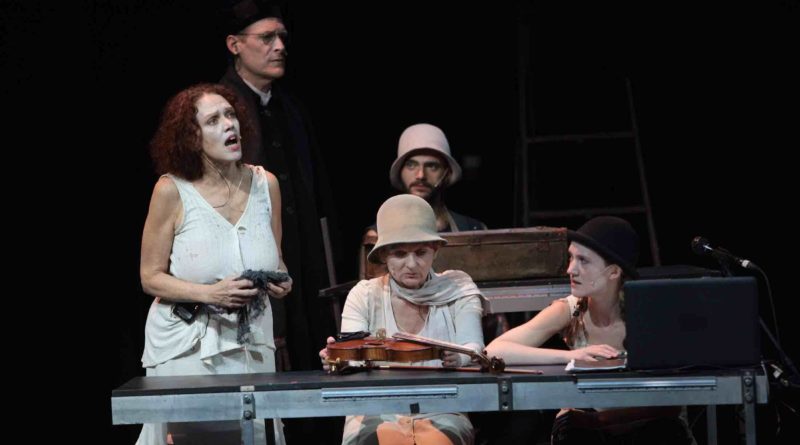INTERVIEW: Wooster Group finds inspiration from avant-garde theater artist Tadeusz Kantor
Photo: The Wooster Group presents A PINK CHAIR (In Place of a Fake Antique) at NYU Skirball. Featured in the show, from left, Kate Valk, Jim Fletcher, Danusia Trevino, Enver Chakartash and Erin Mullin. Photo courtesy of Steve Gunther / Provided by Helene Davis PR with permission.
The Wooster Group, the legendary collaborative theater troupe, has tackled many different types of source material in their unique explorations over the past 40 years. They are unparalleled in their dedication to community-based theatrical creation and vivid, visceral staging that is equal parts experimentation and deconstruction.
Their latest is called A PINK CHAIR (In Place of a Fake Antique), a theatrical exploration of another legendary theater maker: Polish director Tadeusz Kantor, whose 20th-century life was highly influential on the global stage.
A PINK CHAIR gets quite personal and brings to life what Kantor believed about the possibilities that can be found beneath the proscenium. In fact, his daughter, Dorota Krakowska, serves as the dramaturg for the production, which runs Jan. 23 to Feb. 2 at NYU Skirball in Greenwich Village.
“This institute, the Adam Mickiewicz Institute, asked us to make a piece about Kantor,” said Kate Valk, who is featured in the play and also serves as Wooster’s associate director. “They’re from Poland, and so we really didn’t know much about him. So we did some research about it and decided to make this piece with his daughter, Dorota, as our guide.”
The final product, directed by Elizabeth LeCompte, blends together Kantor’s I Shall Never Return with the narrative structure of the myth of Odysseus. When taken together with the Wooster Group’s theatrical contributions — including innovative lighting, sound and video work — this play becomes both an homage to a cultural figure and a wholly original work that honors “spirits past,” according to press notes.
“That was his second-to-last piece,” Valk said of I Shall Never Return. “His last piece he never completed, so I think we just decided to see where he had ended up.”
For LeCompte, working with Kantor’s daughter was a key component of the play’s development process. The collaboration opened up the company’s understanding of the source material, and Krakowska served as something of a lighthouse keeper, showing them the way and shedding light on the unknown.
“When I heard he had a daughter, I met with her, and we immediately bonded,” LeCompte said. “I decided then to find out about him through her in working with the piece. … First of all, I went to Poland twice to go to his archives, to watch archive material, to see all the objects he used, to go to his apartment, his studio, and it wasn’t until after that I came to Dorota and invited her to come as the dramaturg. So from the very beginning of our work process here at the Garage, she was present, and we interviewed her. And some of the interviews are what make the spine of the piece.”

Audience members unacquainted with the Wooster Group should not expect a strict adaptation of the source material. After all, this is the company that has given sometimes radical reinterpretations of wide and varied stories pulled from many segments of society and the canon. Past productions have included The B-Side: “Negro Folklore From Texas State Prisons,” A Record Album Interpretation; Vieux Carré; and The Emperor Jones, among many others. Their magic-making takes place in a legendary space called the Performing Garage in Downtown Manhattan.
“I wonder if Kantor would [understand] how much we’re doing,” Valk said. “We’re so modern. He didn’t have the technology that we’re working with. … You won’t see an imitation of what his actors did because every era finds its own medium, and the way he was working and working with actors is not who we are and what we do. Not only that, we’re American, not Polish. I think we’re very inspired by many of his manifestoes. As a matter of fact, the title of our piece comes from one of his manifestoes. It’s called A Kitchen Chair in Place of a Fake Antique, and we switched it to A PINK CHAIR because we had a certain pink chair that has been in a number of Wooster Group pieces through the decades.”
The Wooster Group recycles many of their props and costumes from production to production. They call these objects part of their “dream logic,” which is actually similar to Kantor’s understanding of theater.
“We’re using our own history and our own store of objects that are important to us because we love his manifesto about the lowest rung, the object that is of the lowest rung,” Valk said. “It’s maybe garbage, but if you lift it and put it on stage in a theater, it’s imbued with much more meaning or spirituality than something you’d go out and design or buy.”
As a press release indicates, a simple pink chair can be given an hallucinatory effect because of its place in the spotlight. Outside the theater, it’s a pink chair. Inside the theater, it means so much more.
Valk said she was fascinated by this dream logic and how Kantor would have a bride, a solider, a priest and other iconographic figures in each of his plays. They were specific to the story being told but also universal in the general consciousness. “It’s the same with us,” Valk said.
LeCompte said the company has been working on the piece for the past two years, when it first premiered. Today’s version hits deeper, the director said.
“There are many complex ideas in the piece, and in translating it to our technique, there’s always interesting new ways to see what he was talking about in a different way, in our way,” she said. “So I think it’s probably gotten a little deeper, but it’s still the same performers because it’s the Wooster Group. And it’s still pretty much the same set because it’s the set we made. In other words, we haven’t changed it structurally.”
Valk added: “It’s very personal because we have a relationship with Dorota. We almost begin the piece with a documentary about interviewing her, and it’s a kind of a funny take on who we are as a theater company and Americans. So there’s an incorporation of some documentary style material about us encountering Dorota and trying to investigate her father’s work with her. … I’m constantly looking at the source material, not making directorial decisions of course because Liz is the director, but I try to get as familiar as possible with all the source material so I can guide her to it.”
Although Krakowska is listed as the dramaturg, LeCompte as the director and Valk as a performer and associate director, there was much collaboration on A PINK CHAIR, which is par the course for the Wooster Group — and Kantor’s work as well.
“We’ve been together enough that everybody is the dramaturg, and everybody contributes,” Le Compte said. “I’m just the only one on the outside. They have to trust me that I will in some way structure it around the ideas that we all come with so that it will be entertaining.”
By John Soltes / Publisher / John@HollywoodSoapbox.com
The Wooster Group’s A PINK CHAIR (In Place of a Fake Antique) will play Jan. 23 to Feb. 2 at NYU Skirball in Greenwich Village. Click here for more information and tickets.

